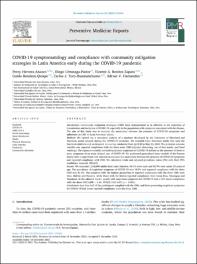Mostrar el registro sencillo del ítem
COVID-19 symptomatology and compliance with community mitigation strategies in Latin America early during the COVID-19 pandemic
| dc.contributor.author | Herrera-Anazco, Percy | es_ES |
| dc.contributor.author | Urrunaga-Pastor, Diego | es_ES |
| dc.contributor.author | Benites-Zapata, Vicente A. | es_ES |
| dc.contributor.author | Bendezu-Quispe, Guido | es_ES |
| dc.contributor.author | Toro-Huamanchumo, Carlos J. | es_ES |
| dc.contributor.author | Hernandez, Adrian V. | es_ES |
| dc.date.accessioned | 2022-10-12T15:08:43Z | |
| dc.date.available | 2022-10-12T15:08:43Z | |
| dc.date.issued | 2021-12-10 | |
| dc.identifier.uri | https://hdl.handle.net/20.500.13053/6854 | |
| dc.description.abstract | Introduction: Community mitigation strategies (CMS) have demonstrated to be effective in the reduction of transmission and incidence of COVID-19, especially in the population with symptoms associated with the disease. The aim of this study was to evaluate the association between the presence of COVID-19 symptoms and adherence to CMS in Latin American adults. Methods: We carried out a secondary analysis of a database developed by the University of Maryland and Facebook social network during the COVID-19 pandemic. We included Latin American adults that used the Facebook platform and participated in a survey conducted from April 23 to May 23, 2020. The principal outcome variable was reported compliance with the three main CMS (physical distancing, use of face masks, and hand washing). The exposure variable included symptoms suspicious for COVID-19 defined as the presence of three or more symptoms of an acute clinical case of COVID-19. We performed generalized linear models of the Poisson family with a logarithmic link function to evaluate the association between the presence of COVID-19 symptoms and reported compliance with CMS. We calculated crude and adjusted prevalence ratios (PR) with their 95% confidence intervals (95%CI). Results: We analyzed 1,310,690 adults from Latin America; 48.1% were male and 42.9% were under 35 years of age. The prevalence of suspicious symptoms of COVID-19 was 18.5% and reported compliance with the three CMS was 45.3%. The countries with the highest proportion of reported compliance with the three CMS were Peru, Bolivia and Panama, while those with the lowest reported compliance were Costa Rica, Nicaragua and Honduras. In the adjusted model, people with suspicious symptoms for COVID-19 had a 14% lower compliance with the three CMS (aPR = 0.86; 95%CI: 0.85–0.87; p < 0.001). Conclusions: Less than half of the participants complied with the CMS, and those presenting suspicious symptoms for COVID-19 had lower reported compliance with the three CMS. | es_ES |
| dc.format | application/pdf | es_ES |
| dc.language.iso | eng | es_ES |
| dc.publisher | Elsevier Inc. | es_ES |
| dc.rights | info:eu-repo/semantics/openAccess | es_ES |
| dc.rights.uri | https://creativecommons.org/licenses/by/4.0/ | es_ES |
| dc.subject | COVID-19, SARS-CoV-2, Social networking, Hand disinfection, Masks, Physical distancing, Latin America, Pandemics, Coronavirus infections | es_ES |
| dc.title | COVID-19 symptomatology and compliance with community mitigation strategies in Latin America early during the COVID-19 pandemic | es_ES |
| dc.type | info:eu-repo/semantics/article | es_ES |
| dc.identifier.doi | https://doi.org/10.1016/j.pmedr.2021.101665 | es_ES |
| dc.type.version | info:eu-repo/semantics/publishedVersion | es_ES |
| dc.publisher.country | NL | es_ES |
| dc.subject.ocde | http://purl.org/pe-repo/ocde/ford#3.03.00 | es_ES |
Ficheros en el ítem
Este ítem aparece en la(s) siguiente(s) colección(es)
-
SCOPUS [380]


